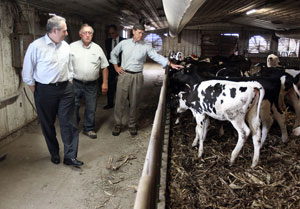
A recent editorial in the Wisconsin State Journal

U.S. Rep. Ron Kind has been fighting for transparency in the federal farm bill for years.
Some might call the La Crosse Democrat’s quest nothing more than tilting at windmills, but we see a knight fighting for a just cause. Americans deserve to know how their tax dollars are spent on crop insurance.
The crop insurance program goes back decades. It helps farmers and ranchers recover from bad weather, low yields or lower-than-expected crop prices.
It also helps smooth out expenses for the federal government, which is less on the spot to come up with emergency funds to respond to individual disasters.
Over the years, mission creep occurred. Congress shifted direct farm subsidies into the crop insurance program.
Farmers and ranchers received premium subsidies. Meanwhile the feds also paid hefty administrative costs for private insurers that participate in the program. In recent years, crop insurance has cost taxpayers about $9 billion annually.
Congress slipped language into the farm bill in 2000 that removed accountability from the insurance program. Where direct farm subsidies had been public records, the crop insurance program was hidden from scrutiny. The federal government and its private insurance partners keep secret where the money goes. That secrecy remains today.
People know how much the total program costs and some broad accounting strokes, but the public has no way to learn specifics. Even some members of Congress likely receive benefits from the program without their constituents knowing.
The agriculture industry has evolved from being dominated by small farmers and ranchers to being dominated by massive industrial agriculture companies. Because the insurance program is neither means tested nor capped, most of the payments go to a few of the wealthiest policyholders. The lack of controls also creates an incentive for smaller farmers to buy the most extravagant policy they — with the help of their federal subsidy — can afford.
The public might be outraged if it could learn the details, but it can’t. The agriculture industry pays handsomely to keep the money flowing. Ag companies and their PACs contribute millions to the campaigns of sympathetic elected officials willing to keep taxpayers in the dark.
For years, Rep. Kind has sought to end that secrecy. He rightly argues that it’s the public’s right to know how Congress spends the public’s money.
Transparency also is fundamental to reform. It’s difficult to lobby to change a program shrouded in mystery.
Kind’s amendments have drawn bipartisan support every time, but never enough to pass.
Maybe this is the year for transparency.
Maybe this is the farm bill that will empower people to hold their government accountable.


